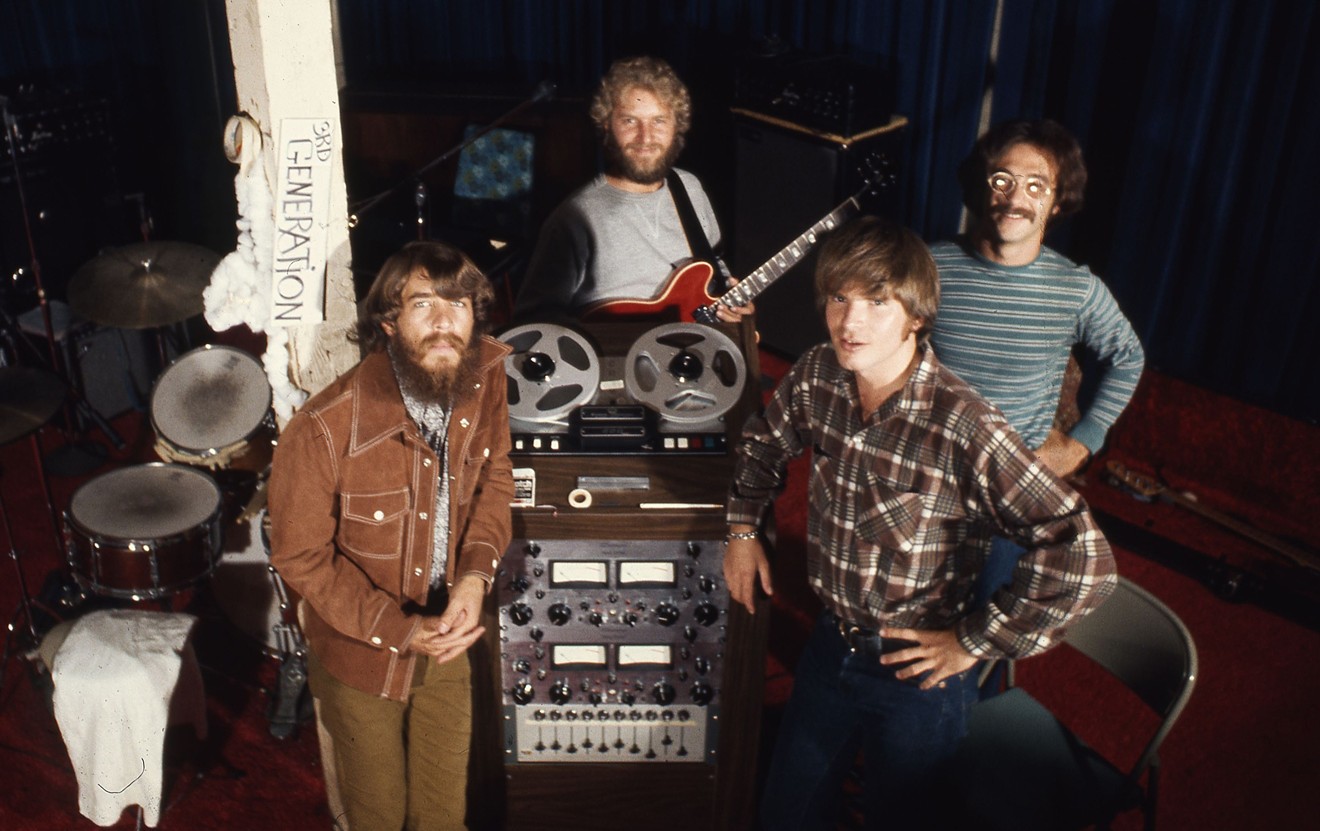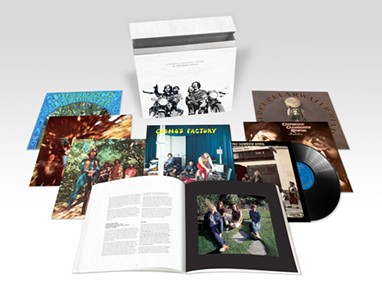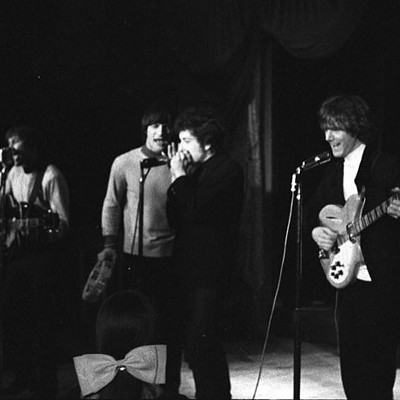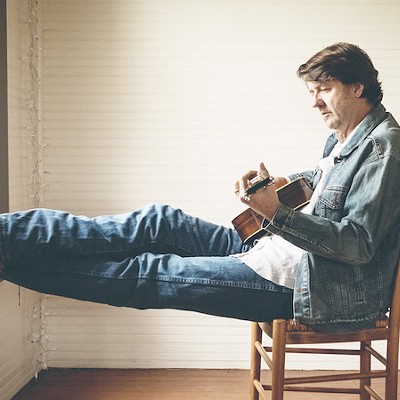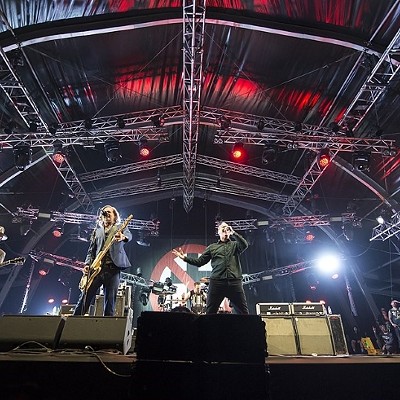In fact, Creedence Clearwater Revival would release a total of seven albums in just four years and a few weeks, chalking up massive selling hits on both AM and FM radio like “Born on the Bayou,” “Proud Mary,” “Fortunate Son,” “Down on the Corner,” “Green River,” “Lookin’ Out My Back Door,” “Up Around the Bend,” “Suzie Q,” “Who’ll Stop the Rain,” "Bad Moon Rising," and an expansive cover of “I Heard it Through the Grapevine” – just to name a few.
It seems that John Fogerty (vocals/lead guitar), brother Tom Fogerty (rhythm guitar), Stu Cook (bass) and Doug Clifford (drums) out of the San Francisco Bay area were busy, busy boys. As of today, they’ve sold 30 million LP records in the U.S. alone.
Now, all seven of Creedence’s LPs (Creedence Clearwater Revival, Bayou Country, Green River, Willy and the Poor Boys, Cosmo's Factory, Pendulum, and Mardi Gras) have been collected in a massive box set The Studio Albums Collection (Craft Recordings). It also features a hardback book with extensive liner notes and a treasure trove of photos, record covers, concert posters, and more.
These 180 gram vinyl records have also never sounded better, using a precision lathe cutting process to improve the sound called “half-speed mastering,” which was completed at Abbey Road Studios from the source masters.
Doug Clifford remembers his reaction when he first held the box set in his own hands. “It was quite a flashback, and I remember the first single we put out after years of trying, and here we are 50 years later and the fans are still there and the music is still viable. It’s a very humbling, warm and fuzzy feeling!” he says.
And the sound has impressed him – not that he could have ever predicted that vinyl would come back. “I mean, here you have world’s hardest material, a diamond with a very sharp point, running over the surface of a soft piece of plastic! Whoever thought of this!” he laughs. “And the half speed mastering really creates an amazing sound, especially in the mid and lower mid-range.”
The members of Creedence Clearwater Revival (or CCR for short), began playing together in bands in the mid ‘60s with names like the Blue Velvets and the Golliwogs before changing their name to the more familiar one in 1968. And while their club band set list included many rock and soul covers, their original material – overwhelmingly written by John Fogerty – had a much bluesier, gritty sound, buoyed by Fogerty’s otherworldy voice. Many listeners just assumed that the band rose up from the Deep South or the bayous of Louisiana. And their album covers did little to dispel the myth.
“It was pretty funny to us! People thought we came from the swamp!” Clifford says. “But we were doing what we always did, and we were students of music that came out of the south and the early rock and roll side. When we all first met, we had virtually the same record collections. So we started with [common] references.”
As the liner notes spell out, most of Creedence’s 45 rpm singles were in fact double-sided hits that became their best known material. In an era where FM rock was gaining a lot of power – the format being basically developed by San Francisco DJ Big Daddy Tom Donahue - CCR still managed to also get heavy airplay on AM stations. But according to Clifford, the pace that the band was working at didn’t seem crazy in the flush of their success.
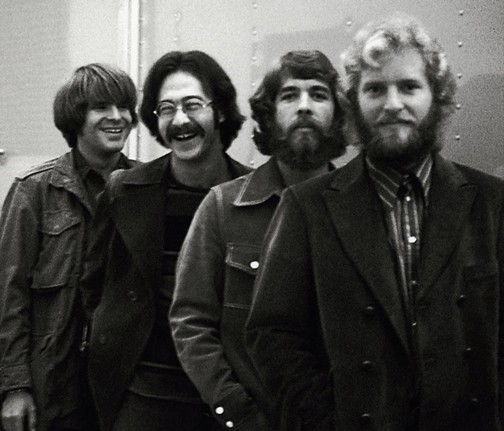
John Fogerty, Stu Cook, Doug Clifford, Tom Fogerty
Photo by Joel Selvin/Courtesy of Craft Recordings
One of the surprise pleasures of The Studio Albums Collection is hearing a lot of the band’s deeper original cuts (“Ramble Tamble,” “Commotion,” “Sailor’s Lament,” “Tombstone Shadow,” and the anti-Nixon “Effigy”) as well as covers of rock and soul oldies like Roy Orbison’s “Ooby Dooby,” Little Richard’s “Good Golly Miss Molly” and Bo Diddley’s “Before You Accuse Me.”
“Those [covers] were the songs we would play in our early shows in the clubs before we had our own hits and was what we listened to growing up,” Clifford offers. “Most people today just buy greatest hits albums and sometimes the original albums of a band aren’t in print anymore, so I’m glad that [this box set] will expose people to a lot of our other material.”
Of all the songs on the albums, Clifford says that “Born on the Bayou” was and is his favorite of all. As a drummer, he says playing this quarter-note song opens up space and makes the backbeat simpler, but more powerful than frenetic playing. When asked about his own contribution to the CCR sound when the singing, guitar, and bass can more easily stand out, he notes that he aimed for a combination of standing out and support.
“All the attention in band is usually on the singer and the guitar player and even early on in rock ‘n roll, the sax player. But to be your best, you have to keep the groove going, what the guy in the truck driving down the road hears,” he says. “If [the drummer] is on it, they make everybody else sound better. Gene Krupa brought the drummers out of the shadows! I saw him in a special when I was 12 or 13 and they showed mostly him and not the band and he was in the white sport coat with the movie star looks. And he had real personality.”

Tom Fogerty, John Fogerty, Stu Cook, and Doug Clifford
Photo by Jim Marshall/Courtesy of Craft Recordings
Unfortunately, relations between the four members never repaired. Tom Fogerty died in 1990, with the brothers never reconciling. At their 1993 induction into the Rock and Roll Hall of Fame, John Fogerty refused to play with his band mates, so Cook and Clifford watch from their seats as Fogerty and others played the music that brought them there in the first place.
Still, Clifford was excited to be honored. “You’re voted in by your peers, and that meant a lot to me,” he says. We had made a mark in music history as one of the biggest bands of our time, and we continued to pick up fans through the generations.”
John Fogerty told his side of the story in the 2015 autobiography Fortunate Son (which Clifford says he has not read). Fogerty continues to play CCR material in his concerts, while Cook and Clifford have done the same since 1995 with other players in Creedence Clearwater Revisited – a name which John Fogerty unsuccessfully tried to stop them legally from using. CCRevisited have dates booked through the next year, but Clifford will end 2018 with a groundbreaking show.
“We’re playing New Year’s Eve – which we don’t normally do. And two shows, which we don’t either!” he laughs. “So we’re working on ‘Auld Lang Syne.’ I hope we get it right in time!”

